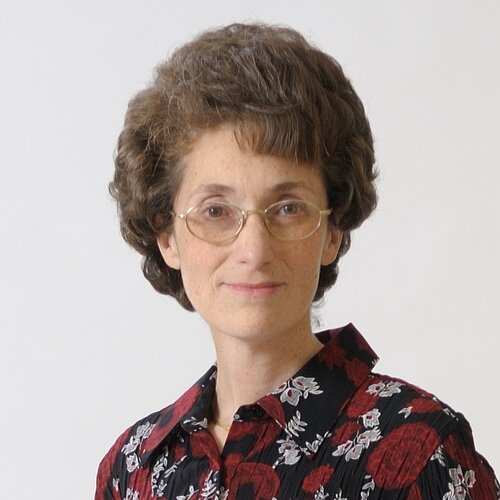
Contact Information
myerscou@illinois.edu
(217) 300-4463
Department of Chemistry
355D Noyes Lab
Mailing address:
600 S. Mathews Avenue, Box 42-1
Urbana, IL 61801
Research Areas
Biography
Professor Nancy Makri received her B.S. from the University of Athens in 1985 and her Ph.D. from the University of California at Berkeley in 1989. She spent two years as a Junior Fellow at Harvard before joining the faculty at Illinois in the spring of 1992. Her research interests are in theoretical quantum dynamics.
Research Interests
Theoretical quantum dynamics of condensed phase processes, with applications to tunneling and coherence phenomena, charge transfer in solution and biological systems, excitation energy transfer in molecular aggregates and coupled spin dynamics.
Research Description
The central goal of our research is to advance the theoretical understanding of quantum mechanical processes in large molecules and the condensed phase. Unless severe approximations are introduced, direct solution of the Schrödinger equation is feasible only for relatively small molecules, as it requires computational effort that increases exponentially with the number of particles. We develop numerically exact, fully quantum mechanical real-time path integral methods and apply them to investigate tunneling and coherence phenomena, charge and energy transfer, and spin dynamics in solution, biological molecules and molecular aggregates.
Awards and Honors
Member, National Academy of Sciences, elected 2023
ACS Award in Theoretical Chemistry, 2023
Member, American Academy of Arts and Sciences, elected 2021
ACS Physical Chemistry Division Award in Theoretical Chemistry, 2021
School of Chemical Sciences Teaching Award, University of Illinois, 2020
The 2019 Löwdin Lecturer, Uppsala University, Sweden
Member, International Academy of Quantum Molecular Science, elected 2010
Fellow, American Physical Society, elected 2001
Bodossaki Academic Prize in Physical Sciences, 2000
University Scholar, 1999
Agnes Fay Morgan Research Award, 1999
Fellow, American Association for the Advancement of Science, elected 1998
Camille Dreyfus Teacher-Scholar Award, 1997
Annual Medal of the International Academy of Quantum Molecular Science, 1995
Sloan Research Fellowship, 1994
Cottrell Scholar Award, 1994
Beckman Young Investigator Award, 1993
National Science Foundation Young Investigator Award, 1993
Packard Fellowship for Science and Engineering, 1993
Additional Campus Affiliations
Professor, Physics
Member, Illinois Quantum Information and Technology Center
Affiliate, Beckman Institute for Advanced Science and Technology
Affiliate, Computational Science and Engineering Program
Honors & Awards
Member, American Academy of Arts and Sciences, elected 2021
ACS Physical Chemistry Division Award in Theoretical Chemistry, 2021
School of Chemical Sciences Teaching Award, University of Illinois, 2020
The 2019 Löwdin Lecturer, Uppsala University, Sweden
Member, International Academy of Quantum Molecular Science, elected 2010
Fellow, American Physical Society, elected 2001
Bodossaki Academic Prize in Physical Sciences, 2000
University Scholar, 1999
Agnes Fay Morgan Research Award, 1999
Fellow, American Association for the Advancement of Science, elected 1998
Camille Dreyfus Teacher-Scholar Award, 1997
Annual Medal of the International Academy of Quantum Molecular Science, 1995
Sloan Research Fellowship, 1994
Cottrell Scholar Award, 1994
Beckman Young Investigator Award, 1993
National Science Foundation Young Investigator Award, 1993
Packard Fellowship for Science and Engineering, 1993
Recent Publications
Pal, R., & Makri, N. (2026). Frustration Protection of Exciton-Vibration Thermodynamics and Transfer. Journal of Physical Chemistry Letters, 17(2), 440-448. https://doi.org/10.1021/acs.jpclett.5c03092
Makri, N. (2025). Discrete Generalized Quantum Master Equations. Journal of Chemical Theory and Computation, 21(10), 5037-5048. Advance online publication. https://doi.org/10.1021/acs.jctc.5c00396
Pal, R., & Makri, N. (2025). Small matrix path integral in imaginary time. Journal of Chemical Physics, 163(12), Article 124122. https://doi.org/10.1063/5.0285317
Vandel, E. L., & Makri, N. (2025). Quantum dynamics of dissipative two-level systems and intradimer excitation energy transfer in the presence of static disorder. Journal of Chemical Physics, 163(4), Article 044115. https://doi.org/10.1063/5.0278194
Blum, V., Asahi, R., Autschbach, J., Bannwarth, C., Bihlmayer, G., Blügel, S., Burns, L. A., Crawford, T. D., Dawson, W., de Jong, W. A., Draxl, C., Filippi, C., Genovese, L., Giannozzi, P., Govind, N., Hammes-Schiffer, S., Hammond, J. R., Hourahine, B., Jain, A., ... Windus, T. (2024). Roadmap on methods and software for electronic structure based simulations in chemistry and materials. Electronic Structure, 6(4), Article 042501. https://doi.org/10.1088/2516-1075/ad48ec